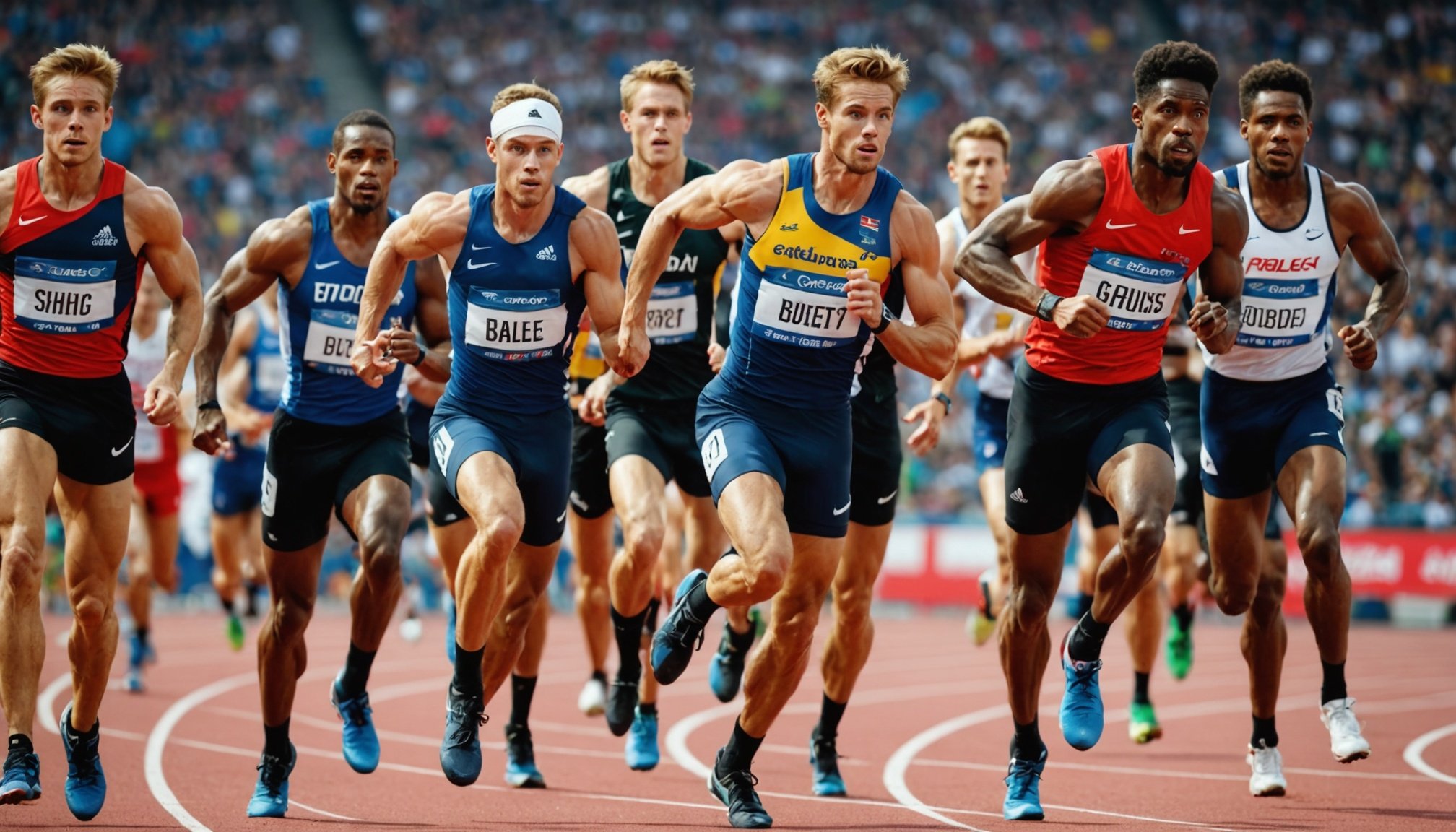The Importance of Sports Nutrition in Athletic Performance
Sports nutrition plays a pivotal role in enhancing athletic performance. Proper nutrition fuels the body, enabling athletes to reach peak physical performance and maintain endurance. The first step involves understanding the specific nutritional demands of competitive sports. Various nutrients come together to support bodily functions that are crucial to excelling in sports.
Managing nutrition before, during, and after competition is key. There is a direct relationship between nutrition and physical endurance. By optimizing nutrient intake, athletes can delay fatigue and sustain energy levels, significantly influencing outcomes in competitive sports competitions. Adequate intake of both macronutrients and micronutrients can make a substantial difference in an athlete’s stamina and overall performance on the field.
Also to see : Protecting Dancers: Top Conditioning Tips to Avoid Overuse Injuries
In addition to improving performance, proper sports nutrition is essential for recovery post-competition. After intense physical exertion, the body needs the right nutrients to repair tissues, build muscle, and replenish energy stores. Recovery nutrition reduces the risk of injuries and prepares athletes for future performance.
Recognition of nutrition’s role supports athletes in making informed dietary choices, thereby enhancing their athletic performance. As the field of sports nutrition continues to expand, athletes have more resources to refine their dietary strategies, tailoring their intake to meet the demands of their specific sports disciplines.
Also read : Maximizing Athletic Potential: How Wearable Tech Transforms Training and Progress Monitoring
Macronutrients: Building Blocks for Athletes
Understanding the role of macronutrients is critical for athletes striving to enhance performance. Each macronutrient – carbohydrates, proteins, and fats – serves distinct purposes in an athlete’s diet.
The Role of Carbohydrates
Carbohydrates are the primary energy source for athletes, particularly those engaged in high-intensity or endurance activities. They are stored as glycogen in muscles and the liver, providing readily available energy during physical exertion. Consuming adequate carbohydrates before competition can significantly enhance stamina and delay fatigue. Choosing complex carbohydrates, such as whole grains and vegetables, ensures sustained energy release.
The Importance of Proteins
Proteins play a vital role in muscle recovery and growth. They supply amino acids, essential for repairing tissues damaged during strenuous activity. Athletes require higher protein intake than non-athletes to support muscle maintenance and recovery. Sources of high-quality proteins include lean meats, dairy products, and plant-based options like legumes and quinoa. Consistent protein consumption post-exercise helps in muscle rebuilding and reduces recovery time.
Fats as Energy Sources
Fats are crucial for long-term energy needs, especially in endurance sports. They are the most energy-dense macronutrient, providing sustained fuel once glycogen stores deplete. Healthy fats, found in avocados, nuts, and fatty fish, support heart health and help in absorbing fat-soluble vitamins. Balancing fat intake with carbohydrates and proteins is essential to meet an athlete’s energy requirements effectively.
Meal Planning and Timing for Optimal Performance
Meal Planning is crucial for athletes to maximize their athletic performance. Tailoring meals to individual sports requirements ensures that energy reserves are fully stocked when needed the most. Nutrition Timing plays a vital role in this context. By scheduling meals around training and competition, athletes can effectively manage energy levels and performance outcomes.
Incorporating strategic pre-workout and post-workout meals is essential. Prior to physical activity, consuming a balanced meal rich in carbohydrates and proteins fuels the body’s glycogen stores, providing the necessary energy for exertion. Examples of effective pre-workout meals include oatmeal with fruits or a smoothie made with bananas and yoghurt, offering a blend of quick and sustained energy sources.
Post-exercise nutrition focuses on replenishment and recovery. An efficient post-workout meal combines proteins to aid muscle repair and carbohydrates to restore glycogen. Grilled chicken with sweet potatoes or a protein shake with whole-grain toast are suitable choices.
Through careful meal planning and optimal nutrition timing, athletes can harness the benefits of sports nutrition to support not only performance but also recovery, ensuring they maintain an edge in competitive sports.
Psychological Aspects of Nutrition in Sports
Understanding the psychological aspects of sports nutrition is crucial in enhancing athletic performance. The relationship between nutrition and mental focus during competitive sports is significant, as the right dietary choices can improve clarity and concentration. This connection is key for athletes aiming to gain a competitive edge. Maintaining focus during crucial moments of a competition can be the difference between winning and losing.
Addressing emotional eating is essential, as it can negatively impact sports performance. Emotional eating often leads to unhealthy dietary habits that can compromise physical readiness and energy levels. Athletes need strategies to recognize and manage this, ensuring their nutrition directly supports their sporting goals.
Developing a positive nutrition mindset is an effective technique for athletes. This involves cultivating healthy habits and a balanced approach to dietary intake, which not only optimizes performance but also contributes to overall well-being. Athletes should integrate practices like mindful eating and routine meal planning, which reinforce positive attitudes towards food.
Incorporating psychological strategies into dietary routines not only enhances physical abilities but also mental resilience, ensuring athletes are equipped for both the physical and mental demands of high-level sports.
Case Studies and Success Stories
Delving into athlete success stories provides insight into the transformative impact of strategic nutritional changes on athletic performance. Real-life applications of nutrition impact can be highly motivating for athletes and inform their dietary decisions to enhance results. Through these case studies, we learn that a balanced approach to nutrition is as crucial as physical training.
One prime example is the story of a celebrated marathon runner who leveraged sports nutrition to boost her stamina. By adjusting her intake of carbohydrates and proteins, she achieved new personal bests, illustrating how a tailored diet can directly influence performance. Such success stories highlight the importance of understanding individual nutritional needs.
Furthermore, a professional swimmer’s experience underscores the role of nutrition in recovery and endurance. By aligning her meals with rigorous training demands, she improved her energy levels, reduced fatigue, and enhanced recovery times. The swimmer’s real-life application of well-researched dietary practices resulted in remarkable progress and consistency.
These stories teach valuable lessons: optimal nutrition strategies can significantly impact athletes’ experiences and outcomes. Recognizing the effects of a well-planned diet encourages others to explore nutrition’s dynamic role in realizing athletic dreams.
Current Research and Expert Opinions
In the realm of sports nutrition, current research underscores its critical role in enhancing athletic performance. Studies demonstrate a strong correlation between tailored nutrition plans and athletes’ achievements in competitive sports. Emerging evidence suggests that individualized diets improve physical endurance and facilitate optimal recovery post-competition.
Sports nutrition research emphasizes the significance of consuming balanced macronutrients tailored to specific sporting demands. For instance, carbohydrates are vital in sustaining high-intensity effort. Recent studies advocate that athletes should adjust their carbohydrate intake based on their training cycles to maximize glycogen stores.
Expert advice further highlights the necessity of proteins and fats in a sports diet. Leading nutritionists recommend a protein-rich diet post-exercise for muscle recovery, whereas healthy fats sustain long-duration energy needs. Nutritionist opinions converge on the notion that precise dietary strategies enhance athletic resilience.
Current research and expert opinions also provide insight into evolving dietary guidelines. They stress the importance of hydration and micronutrient density in athletes’ meals. As research advances, these insights are instrumental in shaping the dietary practices that athletes embrace, offering pathways for enhancing performance through scientifically backed nutrition strategies.






